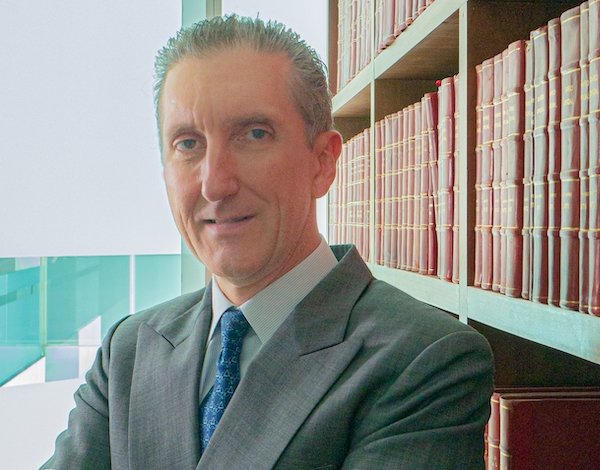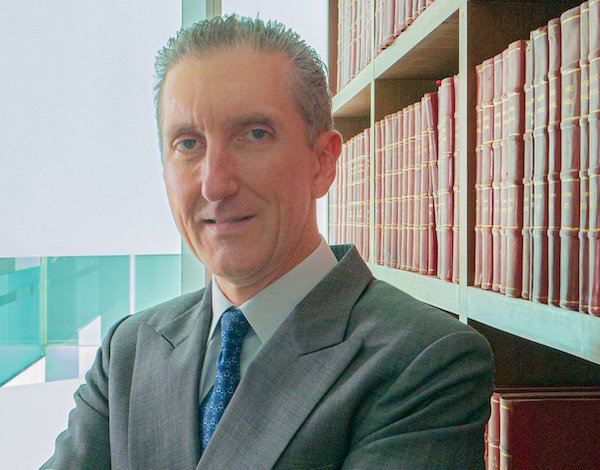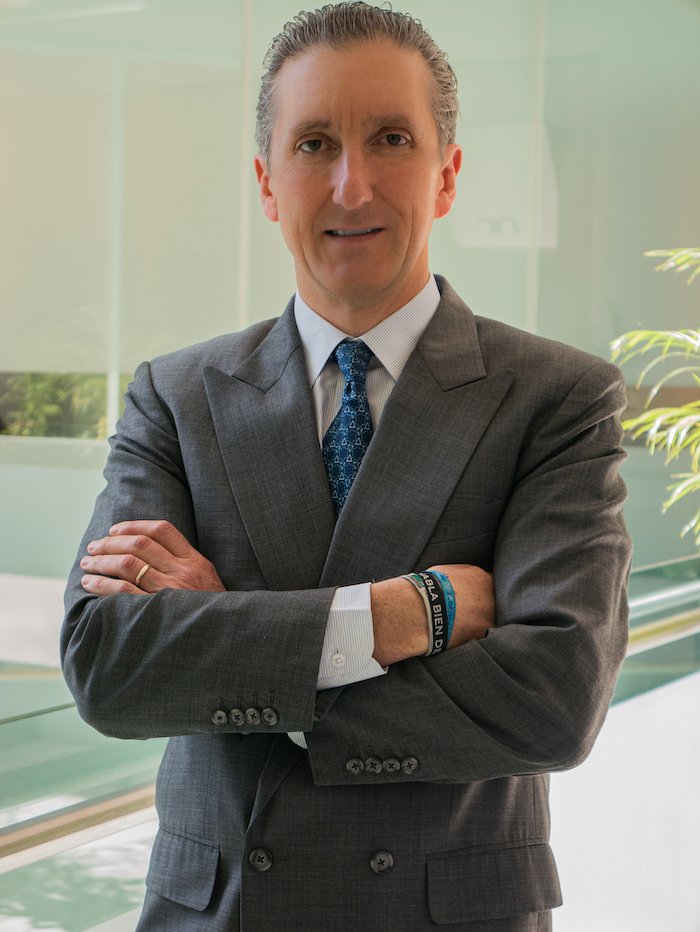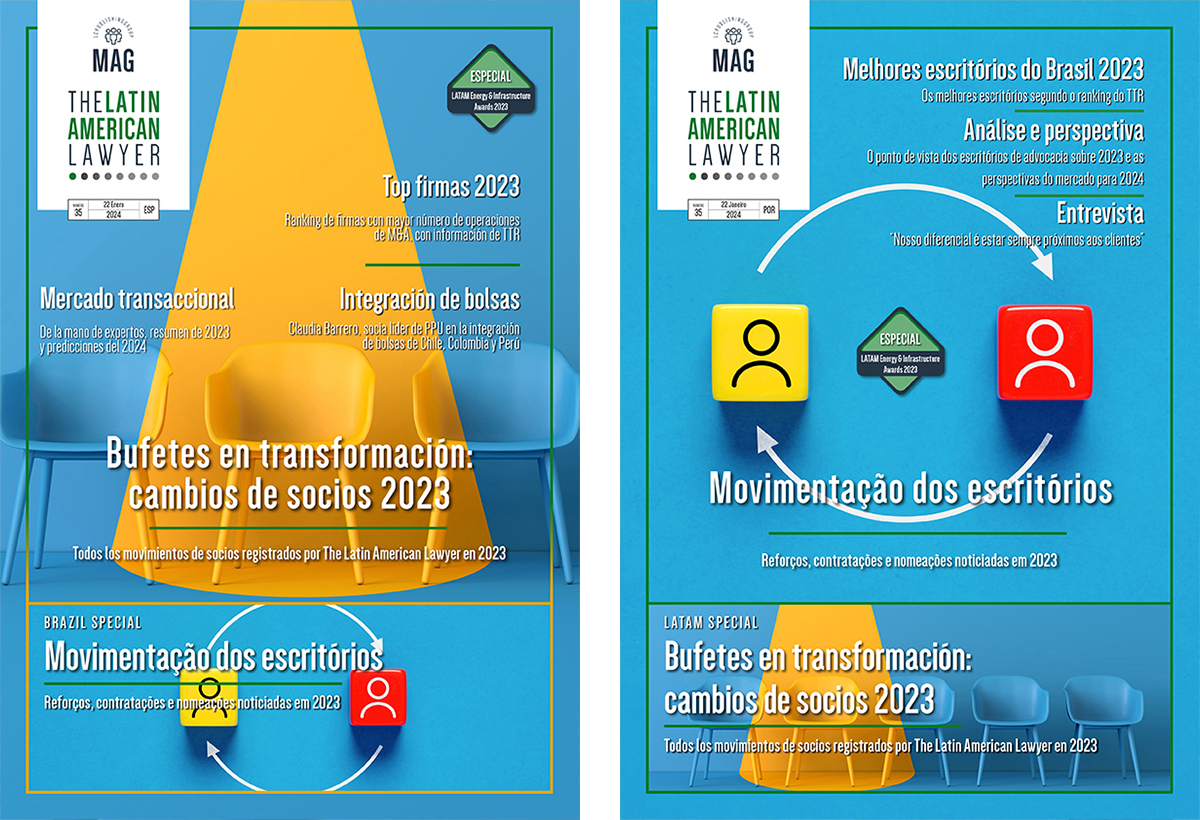Atypical times

Mexico City-based partner Juan Francisco Torres Landa, who was named head of Hogan Lovells’ Latin America practice in July, talks about the challenges of his new role, and those the entire region faces as it grapples with the human and economic costs of the COVID-19 pandemic
 Timing is everything, or so the saying goes, and Juan Francisco’s adoption of a new and expanded role could not have come at a more challenging time, as the world grapples with the COVID-19 pandemic and the subsequent economic fallout. “It’s a big challenge,” he says, even without the grim panorama of the death toll and recession unfolding globally. But he remains upbeat, highlighting the law firm’s and his team’s ability to continue to provide what he describes as the “noble” services that the firm’s clients require in order to navigate these challenging times.
Timing is everything, or so the saying goes, and Juan Francisco’s adoption of a new and expanded role could not have come at a more challenging time, as the world grapples with the COVID-19 pandemic and the subsequent economic fallout. “It’s a big challenge,” he says, even without the grim panorama of the death toll and recession unfolding globally. But he remains upbeat, highlighting the law firm’s and his team’s ability to continue to provide what he describes as the “noble” services that the firm’s clients require in order to navigate these challenging times.
“I’ve spoken to a lot of colleagues in the region, and we have had an atypical time in many senses, but the positive side has been that we knew there would be an important restructuring in the firm, and which meant a lot of changes,” he says, referring to the designation earlier this year of Miguel Zaldívar as Hogan Lovells’ global CEO, a fellow Latino, of Venezuelan origin and who trained in the US, and who had occupied the role of managing partner in Asia, based in Hong Kong. “We now have one area for the Americas, from Alaska to Patagonia, and it made sense to make Latin America a priority area, which is not to say that it wasn’t before,” Torres Landa says.
“A steering committee for Latin America was formed, comprised of seven partners, and which I direct, and which are spread across the offices in Miami, Madrid, New York, Washington, Mexico, São Paulo, and Monterrey. They do not exclude other offices of the firm, but are the ones that have most involvement with clients in Latin America. What we have done is build on a base that was already successful, and to grow even more in the region,” he says.
A PAN-REGIONAL PRESENCE
While the firm has a significant presence in Latin America, it complements that reach through its partnerships with local firms, he explains. “We have strategic alliances with the most outstanding firms in the region, and we have been working closely with them for many years, but also in the last few months to take advantage of the impasse caused by the pandemic, to see how we can be more efficient and profitable by serving our clients without any variation in terms of quality,” he says.
“In the last few months we have been in touch with all those firms, over Zoom calls, and there is a recognition of the importance of Hogan Lovells in the region, and the way we work with all of those partners, in Brazil, Chile, Mexico, and in the Caribbean. We are not Anglo-Saxons who have never even been in the region, without meaning to criticize anybody, but rather we are Latinos with experience of living and working in the region.”
“We acknowledge that the way of doing business in the region is being there, with a direct presence in the region, as in Mexico. But Mexico is different to other countries, for example in Brazil we cannot work in local laws, the country forbids that and we can’t expand much more, we work with partner firms, and so it’s a different way of working, but we work very well with them, and our strategic allies, in various countries, and not just in Latin America, allow us to work across multiple jurisdictions, and we have established a standard of quality that is attractive to our clients, and these are long-term relationships with local law firms, that have even been passed down across the generations.”
He explains that, as the region’s largest and second-largest economies, Brazil and Mexico have traditionally gone head-to-head in terms of which one is the most important market for the firm, and are constantly vying for first place and for attention from the firm.
“It’s like populism versus progress, it used to be the case that it was progress here and populism there, but now things are the other way around,” he says.
And the firm is also seeing opportunities in other countries in Latin America, he says.
“That is the advantage of being a global firm,” he says. “We remain occupied precisely because we are a multi-jurisdictional, full-service firm. But the local market in Mexico is also very important and keeps the firm sufficiently occupied, he says.
“There are regional and cross-border issues, and that allows us to keep busy, rather than just focusing on the local market, but in the context of the pandemic, there is also suddenly the need to focus on regulatory and labour issues, for example.”
And the pandemic, he says, underlines the need for the firm to maintain its diversity, in terms of being able to serve multiple sectors, and multiple needs, simultaneously. “We resist cyclical or counter-cyclical changes, the adverse impact that the pandemic is having, for example, is affecting all sectors, but because we are able to serve all of them, we can cater to multiple needs. You have to adjust to market demands.
In these times, for example, the hospitality, real estate, tourism sectors are having a really bad time of it, but e-commerce, logistics and IT, cyber security, for example, are super busy, and so having the capacity to diversify allows us to move with our clients. We are not an accordion that has to expand and retract according to one line of affairs, but rather we are able to shift our focus by diversifying,” he says.
THE POST-PANDEMIC PANORAMA
There is much speculation among economic analysts in Latin America that there will be major asset divestments as companies seek to restructure and avoid bankruptcy, and Torres Landa also anticipates that.
 “In the next few months there will be a lot of restructuring, there is a serious economic contraction the kind of which hasn’t been seen since the 1930s, and there are no resources to absorb that hit, many companies can’t pay their rent or their salaries. It’s not about rescuing the big companies, but the small and medium-sized ones that cannot remain afloat because there is no liquidity in the economy. There are some 4.5 million companies in Mexico, but only 40,000 of those have more than 100 employees, which means there is a huge number of companies at risk, and the destruction that is going to take place will be brutal. So many companies are going to be unable to survive. It’s not a pretty picture.”
“In the next few months there will be a lot of restructuring, there is a serious economic contraction the kind of which hasn’t been seen since the 1930s, and there are no resources to absorb that hit, many companies can’t pay their rent or their salaries. It’s not about rescuing the big companies, but the small and medium-sized ones that cannot remain afloat because there is no liquidity in the economy. There are some 4.5 million companies in Mexico, but only 40,000 of those have more than 100 employees, which means there is a huge number of companies at risk, and the destruction that is going to take place will be brutal. So many companies are going to be unable to survive. It’s not a pretty picture.”
The Mexican government has provided some financial support to small companies, but which has been widely perceived as grossly insufficient, and it has been disbursed as credit, meaning that it will have to be paid back.
“There is no bailout. There is a serious problem and we are not going to see good times for many companies, and it’s very worrying,” Torres Landa says. “But while we don’t like what we are seeing, we are working to meet our clients’ needs.”
“The pandemic is nobody’s fault, but in Mexico the way the crises has been handled means that a lot of blame lies with the government, and its incorrect way of handling the economic and health crisis has increased the number of deaths. A lot of deaths could have been avoided. But from the economic point of view, we don’t have the bases for a healthy economic recovery,” he says, bemoaning the Mexican government’s focus on large-scale infrastructure projects, such as a tourist train for the Yucatán peninsula.
“How are we going to see an economic recovery if part of the death toll includes the companies that have disappeared? You can’t grow if you’re dead. And that means it’s impossible for the economy to recover and grow. Instead of supporting companies so that they survive, the government is focusing on large-scale and unviable projects that are simply using up finite resources,” he says.
And while the firm had not been expecting to report a good year in terms of revenues, the reduction in income may be less severe than they had previously anticipated, he says, estimating that the firm’s drop in revenues yearon-year in 2020 will likely by less than 5 per cent. “Things will probably be less severe for the firm than how we had anticipated it at the start of the pandemic. But anything is possible,” he says.
“There’s a lot of work to be done. There’s no alternative, just hard work and discipline.”














